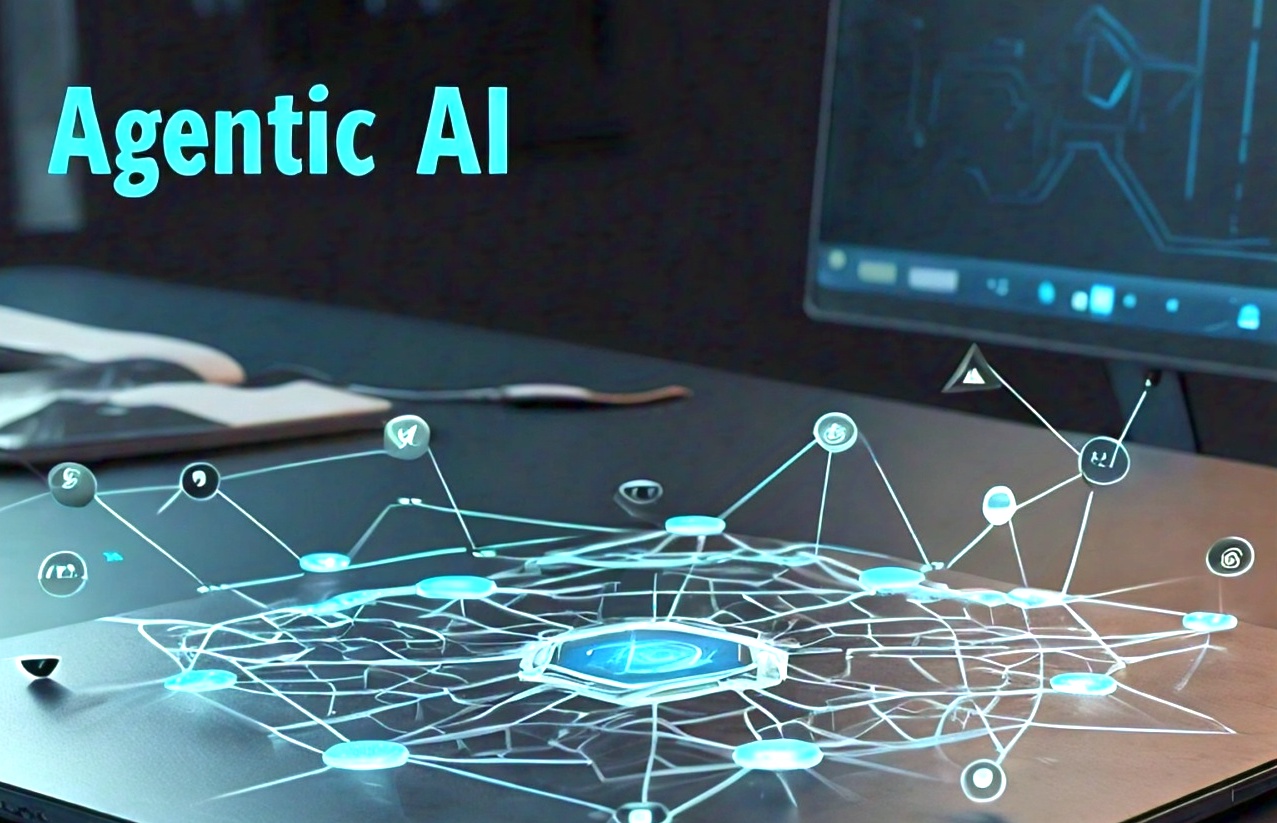In the evolving digital landscape, the integration of artificial intelligence (AI) is no longer a futuristic concept—it’s the present reality reshaping how businesses function. Among the latest breakthroughs is Agentic AI, a transformative force driving innovation, productivity, and strategic automation across industries. As organizations look to harness AI’s potential, agentic systems stand out for their ability to autonomously make decisions, initiate actions, and dynamically adapt to complex environments.
In this article, we explore how Agentic AI is fundamentally altering business structures, redefining workflows, and ushering in an era of intelligent autonomy.
What Is Agentic AI?
Agentic AI refers to systems or digital agents endowed with autonomous decision-making capabilities. Unlike traditional AI models that require constant human input or guidance, agentic systems can:
A. Analyze real-time data independently
B. Make context-based decisions
C. Execute tasks without waiting for commands
D. Learn from outcomes to improve future actions
These agents mimic human behavior in terms of initiative and reasoning, making them ideal for dynamic and complex tasks that demand rapid, intelligent responses.
While the term “agentic” comes from “agency”—the capacity to act independently—Agentic AI extends this concept into artificial systems that simulate human-like autonomy.
Core Features of Agentic AI
Agentic AI differs from rule-based automation or predictive models. Its uniqueness lies in the following features:
A. Goal-Driven Behavior
Agentic AI systems are engineered with clear objectives. Whether optimizing supply chains, managing customer service, or handling financial analytics, the AI pursues specific goals by adapting to circumstances and selecting the most effective strategies.
B. Autonomous Decision-Making
These agents operate without direct supervision. For instance, an agentic system in an e-commerce setting might autonomously adjust pricing based on competitor trends, customer behavior, and market shifts.
C. Continuous Learning
Agentic AI uses machine learning algorithms to learn from both success and failure. As these systems encounter new scenarios, they refine their strategies to achieve better outcomes.
D. Environmental Awareness
These agents can perceive and respond to changes in their environment. This includes reacting to real-time data, detecting anomalies, and adjusting behaviors accordingly.
How Agentic AI Is Reshaping Business Models
Businesses across various sectors are adapting to Agentic AI due to its unparalleled efficiency and strategic advantage. The implications are profound and far-reaching.
A. Intelligent Automation at Scale
Agentic AI empowers businesses to automate high-level processes traditionally managed by humans. From marketing campaigns to HR onboarding processes, these systems manage workflows with little to no manual intervention.
Examples:
-
In logistics, agents can reroute shipments in response to weather or traffic data.
-
In finance, they can flag fraudulent activities by analyzing spending patterns in real-time.
B. Enhanced Decision-Making
With vast data input, Agentic AI can evaluate multiple factors simultaneously and provide recommendations or actions faster and more accurately than humans.
Use Case:
In healthcare, an agentic AI system could assist doctors by suggesting treatment options based on patient history, genetic data, and the latest medical research.
C. Operational Agility
Agentic AI adapts to changing environments, helping companies remain agile. It enables businesses to pivot strategies in real-time—critical in volatile markets or crisis situations.
Example:
During supply chain disruptions, an agentic AI might source alternative suppliers, recalculate delivery schedules, and inform stakeholders without human prompting.
D. Cost Efficiency and Resource Optimization
Agentic systems significantly reduce labor costs and operational overhead by handling routine, repetitive, or data-intensive tasks with greater speed and accuracy.
Industries Leading the Agentic AI Revolution
Agentic AI is not confined to tech firms—it is making waves across multiple industries:
A. Retail and E-Commerce
-
Dynamic pricing and inventory management
-
Personalized customer experiences through AI-driven recommendations
-
Automated customer support using conversational agents
B. Financial Services
-
Fraud detection and risk analysis
-
Autonomous trading algorithms
-
Compliance monitoring and audit trail management
C. Healthcare
-
Patient diagnostics assistance
-
Automated appointment and record management
-
AI-driven drug discovery
D. Manufacturing
-
Predictive maintenance
-
Smart robotics on the production floor
-
Real-time inventory and logistics planning
E. Marketing and Advertising
-
AI-powered campaign optimization
-
Target audience segmentation
-
Content generation and distribution
Benefits of Adopting Agentic AI in Business
Companies that successfully integrate Agentic AI reap a wide range of benefits that contribute directly to their bottom line and strategic growth.
A. Increased Productivity
AI agents work round the clock without fatigue, handling high volumes of tasks and freeing human workers to focus on innovation and strategy.
B. Improved Accuracy
By eliminating manual input and relying on data-driven algorithms, businesses can reduce errors significantly, especially in data-sensitive industries like healthcare or finance.
C. Faster Time to Market
Agentic systems accelerate product development and marketing cycles by automating research, analysis, and content production.
D. Personalized User Experience
AI agents can tailor customer interactions in real time, improving satisfaction and increasing the likelihood of conversion or retention.
Challenges and Risks in Implementing Agentic AI

Despite its many advantages, integrating Agentic AI comes with challenges that businesses must consider.
A. Ethical and Privacy Concerns
Autonomous AI raises issues about accountability. Who is responsible when an AI makes a poor decision? Furthermore, access to personal data demands robust privacy measures.
B. System Transparency
Agentic AI often functions as a “black box”—its decision-making process can be difficult to interpret, creating transparency issues, especially in regulated industries.
C. Workforce Displacement
Automation may lead to job losses or significant shifts in labor roles, prompting the need for upskilling and workforce reskilling initiatives.
D. Technical Complexity
Building and maintaining agentic systems require advanced skills in machine learning, natural language processing, and data engineering—resources not all companies currently possess.
Steps for Businesses to Integrate Agentic AI
To maximize success, companies should follow a structured approach to integrating agentic technologies:
A. Define Business Goals
Start by identifying processes where autonomous decision-making can provide the highest ROI. Prioritize areas with clear objectives and measurable outcomes.
B. Assess Data Readiness
Ensure that your data infrastructure supports real-time processing, is clean, and accessible. Agentic AI is only as good as the data it learns from.
C. Choose the Right Technology Stack
Invest in scalable platforms that support continuous learning, integration with existing systems, and cloud-based data operations.
D. Implement in Phases
Avoid a complete overhaul. Start with pilot programs to measure impact, and scale up gradually based on performance and feedback.
E. Monitor and Optimize
Continuously assess the performance of agentic systems and refine them as needed. Regular audits and testing help maintain quality and alignment with business goals.
The Future Outlook of Agentic AI in Business
Looking ahead, Agentic AI will continue to evolve, driven by advances in neural networks, reinforcement learning, and quantum computing. Businesses that act now will gain a competitive edge as AI reshapes every aspect of how organizations function.
Key Predictions:
A. Increased Collaboration Between AI and Humans
B. Regulatory Frameworks to Govern AI Autonomy
C. Mainstream Adoption in Small and Mid-Sized Enterprises
D. Emergence of AI-Powered Digital Workforces
E. Integration with Augmented Reality and IoT
Conclusion: Embracing the AI-Driven Future
Agentic AI is not just a tool—it’s a transformational force that will define the next chapter of business evolution. From enhancing customer service to automating operations and enabling strategic agility, these intelligent agents are key to maintaining relevance and competitiveness in the digital economy.
Companies that understand and embrace the power of autonomous systems today will be the market leaders of tomorrow.








